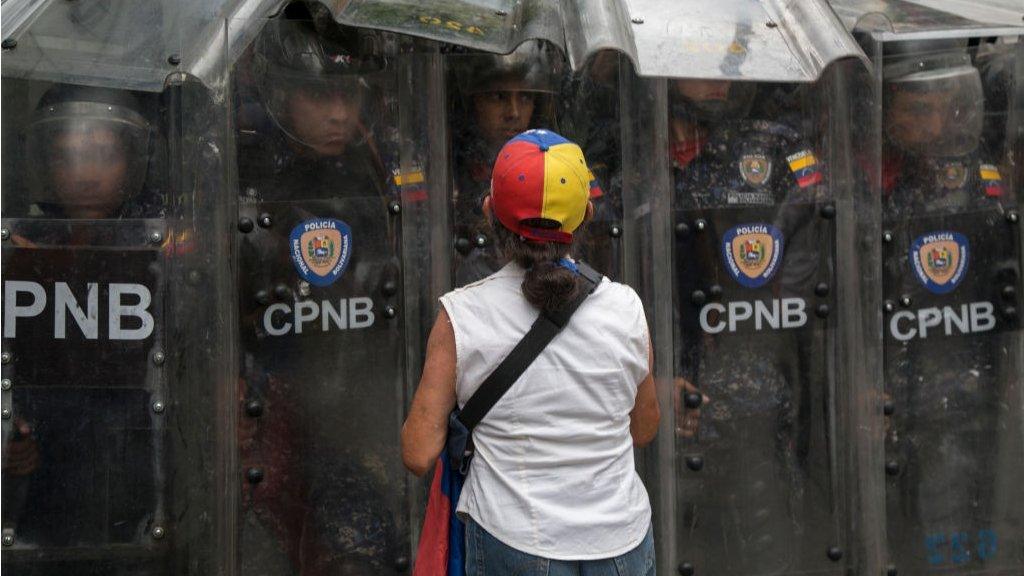Venezuela President Maduro sworn in for second term
- Published
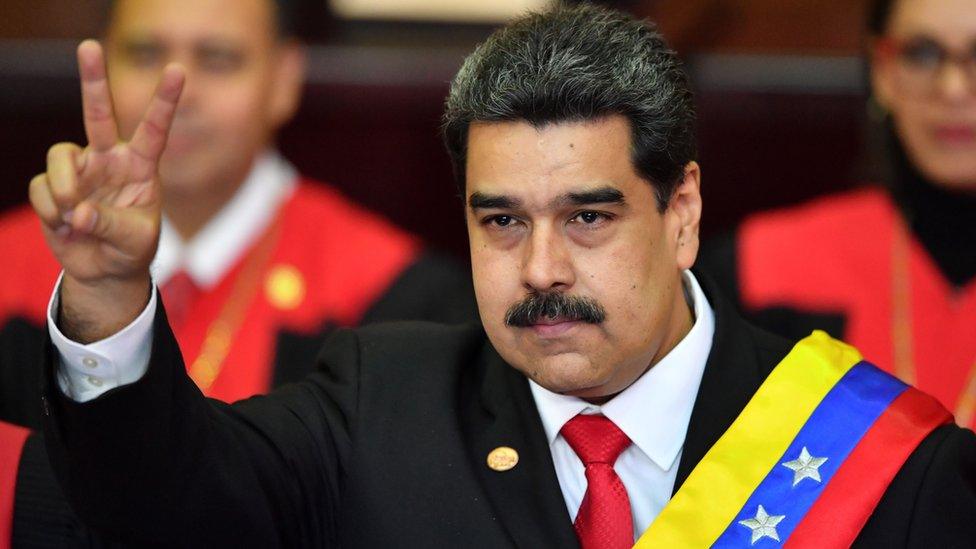
Nicolás Maduro has dismissed claims of foul play in his election victory last May
Nicolás Maduro has been sworn in for a second term as Venezuela's president, despite international criticism that his re-election was illegitimate.
The May 2018 polls were marred by an opposition boycott and vote-rigging claims.
The US and 13 other countries in the Americas said last week that they would not recognise Mr Maduro's presidency.
The socialist leader, 56, said his new six-year term was a "step of peace for our country."
Thousands of spectators gathered for the ceremony in Caracas, including Nicaraguan President Daniel Ortega, and president of Bolivia Evo Morales.
Security forces were stationed in the capital and other cities, as opposition groups called for pot-banging and the sounding of horns in protest during the ceremony.
"Venezuela is at the centre of a world war led by the United States imperialism and its satellite countries," Mr Maduro said in a speech.
"There are problems in Venezuela, like in any other country. But we, Venezuelans, have to sort it out, without foreign intervention," he added.
The Venezuelan leader also said the political right in Latin America has been "contaminated," citing the rise to power of Brazil's President Jair Bolsonaro, whom he termed a "fascist".
The re-inauguration took place before the country's Supreme Court instead of its opposition-run Congress, which has been stripped of its powers since Mr Maduro's ruling Socialist Party lost control of it in 2016.
Minutes after Mr Maduro was sworn in, Paraguayan President Mario Abdo tweeted that he was cutting diplomatic ties with Venezuela and immediately withdrawing his country's diplomats from Caracas.
The Organization of American States also approved a resolution declaring his second term "illegitimate."
Nicolás Maduro celebrates his victory

Why is Maduro's re-election controversial?
Mr Maduro was first elected in 2013, succeeding Hugo Chavez who died of cancer after governing for 14 years.
He was re-elected in May last year, in a poll that had initially been planned for December. But the vote was marred by an opposition boycott and allegations of vote-rigging.
The country's National Electoral Council (CNE) put voter turnout at 46%, but political opposition groups allege it was even lower.
Venezuela's main opposition coalition said the election date had been changed to take advantage of disarray within opposition groups.
It also argued that some of the most promising candidates had been banned from standing or jailed, while many others had fled the country.
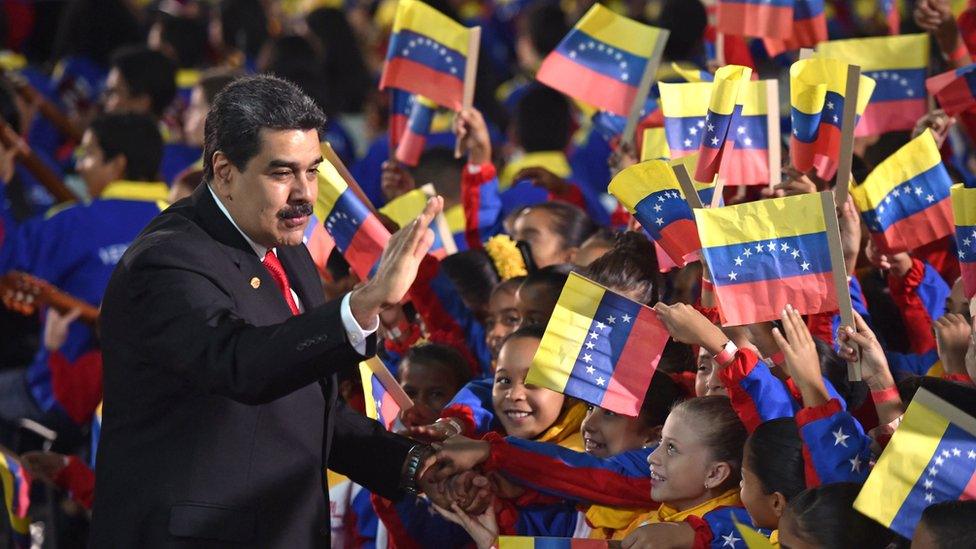
Nicolás Maduro has served as president of Venezuela since 2013
The main opposition candidate, Henri Falcón, rejected the result soon after the polls closed and called for new elections.
Earlier this week, Supreme Court judge Christian Zerpa fled to the US in protest at the president's second term, arguing that the election "was not free and fair".
The US mission to the United Nations called the process an "insult to democracy."
Neighbouring Bolivia, Nicaragua, El Salvador and Cuba expressed their support for the election results.
Mr Maduro has dismissed claims of foul play, saying "the opposition must leave us alone to govern."

Why has his government been criticised?
Since taking office Mr Maduro has been condemned at home and abroad for alleged human rights abuses and for his handling of the economy, which is in a state of near-collapse.
Venezuela is one of the world's largest oil producers and holds the presidency of oil cartel Opec until 2025.
But an overreliance on oil - it accounts for about 95% of its export earnings - left the country vulnerable when prices dropped in 2014.
As a result, the cost of imported goods like food and medicine has risen, and currency inflation has skyrocketed.
The government is also increasingly struggling to get credit after it defaulted on some of its government bonds. In response, the government has printed more money, devaluing the currency further.
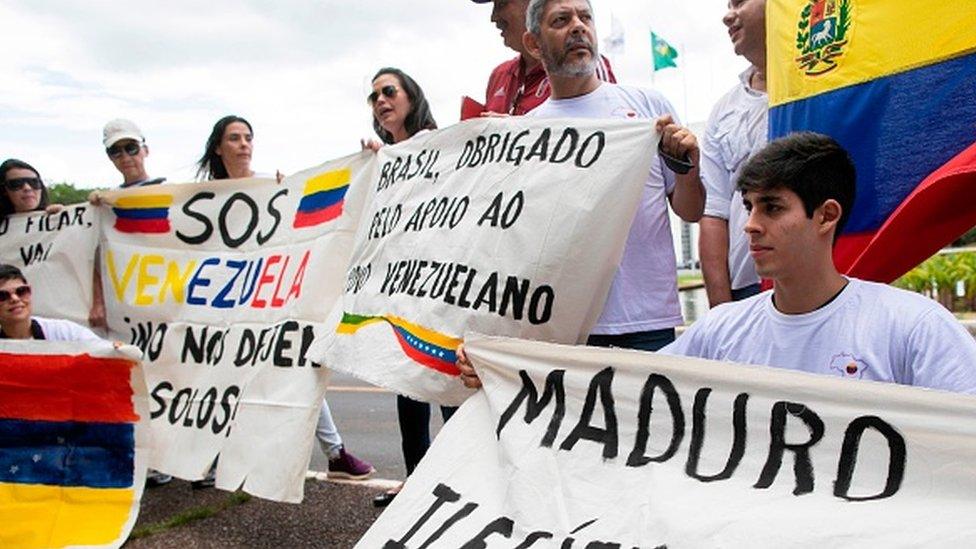
Venezuelans in Brazil take part in a protest against Nicolás Maduro's inauguration
According to a study by the opposition-controlled National Assembly, Venezuela's annual inflation rate reached an eye-watering 1,300,000% in the 12 months to November 2018.
The US has also imposed sanctions which Mr Maduro claims cost Venezuela $20bn last year.
The United Nations says 2.3 million Venezuelans have fled the country since 2015 because of economic hardship.
Anti-government riots in 2014 left 43 dead, and at least 125 people died in months of protests in 2017.
Mr Maduro told reporters last year that the US was plotting to kill him and topple his government, but did not produce any evidence.
- Published21 May 2018
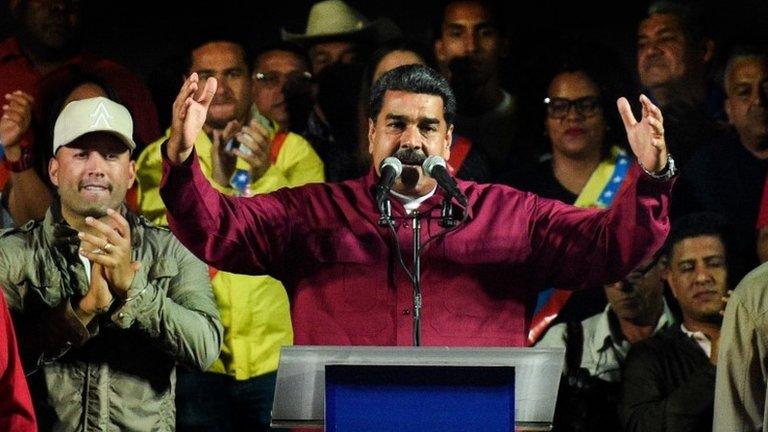
- Published12 August 2021
